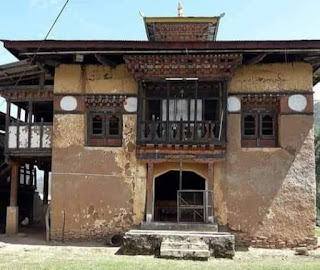A MAN WHO SACRIFICED HIS LIFE FOR WATER
During the tenure of Paro Pönlop Tshering Penjor (1902-1949), a feud broke out over irrigation water that claimed the life of a person from Khangkhu. The voluntary manslaughter led Paro Pönlop to taking compensatory legal action against the community of Taju-Wangthangka. As wished for by the victim before his death, the verdict also favoured the community of Khangkhu. Although Taju-Wangthangka is situated above Khangkhu and closer to the lone water source, during the paddy plantation season, Khangkhub has held the right over water to cultivate first.
Sources claim that in recent times, the Taju-Wangthangka has appealed to the Court of Justice to reverse the old verdict, however, their appeal bore no fruit pertaining to its historic importance.
Anyway, how did the incident unfold? The story goes like this.
One busy summer in Paro, amid the paddy cultivation, the folks of Taju-Wangthangka refused to share water with Khangkhub. As such conflicts between the two communities broke out.
One evening, a kindhearted yet bold elderly man from Khangkhu contrived to do something selfless for his community. He shared his plan with his own folks. He told them that he would go and tamper the irrigation channel on purpose and divert all the water to Khangkhu. He said, in retaliation, he would be killed by the Tajub. However, following his demise, he urged the Khangkhub to fight for the water as compensation in lieu of the money the victim's family would get. Initially, his idea was met with some resistance but since he insisted upon it, the community allowed him to do what he wished for.
Accordingly, in broad daylight, he executed his plan. He tampered the water diversion. Furious, the folks of Taju-Wangthangka got the man murdered on the spot following a brief altercation. Khangkhub then appealed to Paro Pönlop Kuzho Tshering Penjor for the compensation. Unlike usual compensation, they demanded irrigation water for the life lost. To which the Tajub-Wangthangkab had to agree. By and large, the verdict upheld the legal axiom: གཏམ་བ་རྨ་བདེན། རྨ་བ་རོ་བདེན།
While a source claims that the person who died for the community was a serf belonging to a noble family, the true nobility lies in the selfless character of the man. He proved nobler than the noble.
I tried to get a copy of the verdict but to no avail.
Oral source: Dasho Ugyen Tshering et al.






Comments
Post a Comment